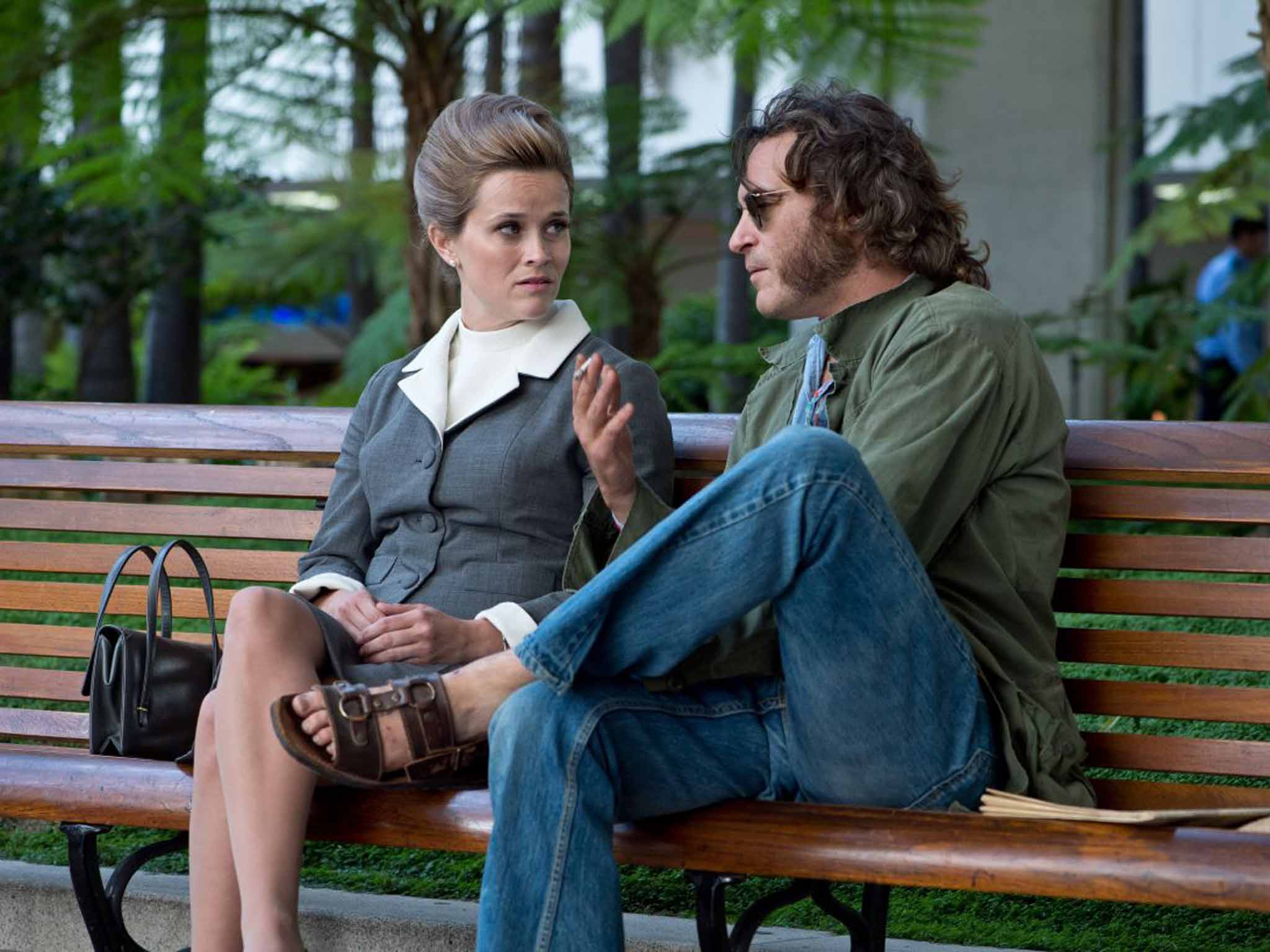Inherent Vice, film review: Joaquin Phoenix and Owen Wilson star in a brilliant and strange modern Hollywood noir
The first fully-fledged adaptation of a Thomas Pynchon novel could have been a disaster. Instead it is a master stroke, writes Geoffry Macnab

Watching Paul Thomas Anderson’s wonderfully textured and intricate LA-set Inherent Vice, you are easily reminded of the famous story about Howard Hawks’ version of The Big Sleep (1946). A baffled Hawks and his collaborators wrote to author Raymond Chandler asking whether a chauffeur in the story was murdered or had committed suicide and were gratified when Chandler wrote back saying he didn't "know either."
As played (quite brilliantly) by Phoenix, Doc never turns into a figure of ridicule. For all his foibles and his immense drug consumption, he has a gravitas about him that makes us take him at least half seriously. He is also very dogged in his pursuit of “Golden Fang,” the vertically integrated Indo-Chinese drug smuggling ring that seems to be behind the mystery.
One of the pleasures of Inherent Vice is its richly detailed evocation of the looks and sounds of 1970s California. Anderson shot it on 35mm Panavision, not digital, and his movie has extra grain and resonance as a result. This is a city still haunted by the Manson family’s murder of Sharon Tate the year before. In one very funny scene, a cop stops Sportello as he is driving in a car with drug crazed dentist Dr Rudy Blatnoyd (Martin Short) and friends. The cop tells them all that any gathering of more than three or four counts as a “cult.” We’re in a world of black power guerrillas and neo-Nazi white supremacists - who sometimes form alliances of convenience. Richard Nixon is hovering in the shadows, ready to suppress the hippies’ dreams of peace and love, and there are frequent references to governor Ronald Reagan’s privatisation programme which has changed the face of Californian insane asylums.
Oscars 2015 nominations
Show all 28Anyone who goes to Inherent Vice expecting a lean, action-driven Michael Mann-style movie will be confused and disappointed. Everything here is distended and opaque. The fuzziness of Doc’s sleuthing shouldn’t blind us, though, to the consummate skill and clarity of Anderson’s storytelling. There are framing devices within framing devices. As in many film noir-style melodramas, he offers us a voice-over. This comes from Sortilege (Joanna Newsom). It is poetic, full of strange astrological references and serves only to confuse the plotting.
As the film begins, Doc is getting over the break-up of his relationship with the beautiful Shasta Fay Hepworth (Katherine Waterston), now going out with am egomaniacal property magnate called Mickey Wolfmann (Eric Roberts) who is “technically Jewish but wants to be a Nazi.” She comes to Doc for his help in stopping Mickey being abducted in some shadowy plot being hatched by Wolfmann’s wife Sloane (Serena Scott Thomas) and her Sterling Hayden-lookalike lover. Soon Wolfmann disappears and so does Shasta. To complicate complicated matters even further, Doc is also helping out a former drug addict turned drug counsellor Hope Harlingen (Jena Malone) whose jazz musician husband (Owen Wilson) has likewise gone missing is mysterious circumstances. Hope’s role as drugs counsellor, as she sees it, is to “talk kids into sensible drug use.” In her world, the idea of actually going without drugs altogether is beyond thinking about - even if, as she says more than once, heroin does drain the calcium from your teeth.
Inherent Vice is a buddy movie of sorts. The buddy in question is the square-jawed cop, Detective Bigfoot (Josh Brolin in brash, scene-stealing mode), who is Doc’s equal and opposite. He hates hippies and has a buzzcut that makes him look like a GI. Bigfoot describes himself as a “renaissance” detective but he turns out to be just as mixed up and tormented as Doc himself.
All the protagonists in Inherent Vice could easily have seemed like comic book caricatures and the film could have dribbled off into sub-Tarantino-style whimsy. However, even the most preposterous scenes are shot in a rigorously formalist style. Anderson is fascinated by the architecture of Los Angeles and will hold shots of modernist buildings for what seem like a mini-eternity. The film is also strangely and surprisingly moving. The characters are far easier to warm to than those egomaniacal protagonists in recent Anderson movies like The Master or There Will Be Blood. All of a sudden, there will be blast of a plaintive Neil Young anthem from the period on the soundtrack. Anderson doesn’t downplay Doc’s sense of yearning or his love for Shasta. She is far more ethereal than the typical Lauren Bacall-like femme fatale but has the same ability to bewitch men. There is one eerie and bizarre scene in which she strips and lies over Doc, like some hippie mermaid.
At 148 minutes, this isn’t a taut thriller. It often seems as wayward and easily distracted as Doc is in his investigations - but like its central character, the film never loses its thread entirely. Thanks to Anderson’s bravura editing style and use of music, the storytelling becomes ever more beguiling. He is the first US director to make a fully fledged feature adaptation of a Thomas Pynchon novel. He has also delivered a film that, in its own Cheech and Chong fashion, fully lives up to the best traditions of classical Hollywood noir.
Subscribe to Independent Premium to bookmark this article
Want to bookmark your favourite articles and stories to read or reference later? Start your Independent Premium subscription today.

Join our commenting forum
Join thought-provoking conversations, follow other Independent readers and see their replies